QuestionDear Natasha,
I am an adult male who has only rudimentary knowledge of mice gained by books and the Internet. I am impressed by your bio and background and have a couple of questions that I hope you can answer. I found my white mouse, Mildred, in my dining room one night (I think someone dropped her through my mailslot) and I had her for over two years.
Early this year, I bought three mice from a pet store and I knew that males will fight unless they are littermates. The man at the store assured me that they were raised together, so I bought them and put them in a ten gallon tank with a wheel, places to hide, etc. I named them Moe, Larry, and Curly. When I first got them, PU!!!...did they ever stink! I could smell them upstairs.
After a few days, I noticed that Moe was getting attacked by the others, so I bought another ten gallon tank for him. Then Curly was being harassed by Larry and I bought a third tank. More toys and wheels and everyone seemed happy.
After a few weeks, Moe was exhibiting sores on his body. He is a black and white mouse and they were quite obvious. Larry is a wheel addict and runs to hide when you get near his fish tank, but he is really nice to hold. He, too, had a big sore on the nape of his neck. Curly seemed unscathed.
I took Moe and Larry to the vet and found out that they had mites, most likely gotten at the pet store. The vet prescribed drops to put at the base of their little necks and the mice cleared up really quickly. You are right, it was expensive, but I could not see them suffer.
I work long hours and often do not see the mice(except for Moe, who is out of his "house" a lot), but I will hear them when I'm going to bed spinning their wheels to their hearts' delight. Last week, though, I noticed that Curly was walking in circles with his head tilted back a little. He did this for a minute or so and then ran off into his hiding place.
In addition, I have several parrots (from rescues), budgies, a hamster, and turtles and I try to take the best care of them that I can. I read where a 5 gallon tank could house a mouse or two and should be cleaned every week, so I was in the general practice of cleaning out my ten gallon tanks every two weeks. I would replace the bedding with several inches of either recycled cardboard or ASPEN bark and would give the mice shredded paper towels every day or so for them to add to their nests. I usually clean the cages on weekends and use the old litter for mulch around trees and bushes. Last month, to my shame, I didn't clean the tanks out for about three weeks due to events such as a niece's wedding and a short trip to Philadelphia.
I mentioned Curly with his circle running. One morning, I saw him sitting in his tank and I lifted the lid to pet him and he was dead. Just sitting up dead! His eyes were open and there didn't look like anything was wrong with him, except for the fact that he was sitting on his straight tail which was pointing forward. After examining him, the only peculiar thing that I noticed were some brown stains around his anus. His fur looked good and he didn't seem to be thin. Curly did, though, like to scatter his food out of the bowl and all over the place.
I did some research online and found information on micoplasmosis which stated that it was a respiratory condition caused by unsanitary conditions. It also said that head tilting (caused by ear infections) and red fluid from the nose and eyes can be manifested. Curly didn't have the red fluids but he did seem to have the head tilts. My other mice seem fine (although Moe is a little fat) and the info said that micoplasma bacteria is already in the mouse and that their urine's ammonia smell exacerbates it.
Do you have any experience with this? Without scolding me too much, should I change my husbandry practices? Again, the mice's cages didn't seem that badly soiled even after two weeks.
I had fed my mice a basic mouse or hamster diet with a mixture of pellets and grains. As I said, Moe is getting pretty pudgy, so I got mouse "blocks" and am feeding them more of them and less grain. I feed them veggies a couple of times a week, usually fresh collard greens, because that's what my turtles (and I!) eat. I'm thinking that Curly may have had diarrhea because of the brown stains on his bottom.
I know that this is an especially long "question" but I appreciate greatly reading your interesting answers to others and knew that you could help me. By the way, my mice are about a year old, I guess. I see variable information about life span, anywhere from 1 to 4 years. What's your general experience with mouse longevity?
Thank you so much for answering my concerns.
Most sincerely,
Randy
AnswerDear Randy,
Welcome to the wonderful world of Mouse. The story of Mildred the Mail Slot Mouse had me in giggles. Thank you for reading my previous posts. I appreciate that.
It's more accurate to say that male mice NEVER get along UNLESS they are litter mates; that is, even litter mates often don't continue to get along, as you found out.
I'm glad you brought Moe and Larry to the vet and treated them for mites. If you write back, tell me what drops s/he used and the treatment regimen. I assume you treated Curly at the same time.
Head-tilting can be a common symptom of any of a number of brain problems which affect the inner ear. My rabbit, for instance, was tilting just before she suddenly died of e. cuniculus, which is a brain parasite that mice can also get. Ear infections can also occur for different reasons. Allergies can cause this as well, as can other toxins or injuries. For instance, even the mite treatment could be suspect, though I would never choose to not treat for mites simply for fear of a reaction.
Thus although it is true that the mouse may have had something like micoplasmosis, exacerbated by the ammonia in the urine, it could also have been any of a number of other things. I am actually less strict about mouse-cleaning than many, and I think a ten gallon tank for one mouse should be plenty for 2 or even 3 weeks; really, it's the sniff test that matters. Don't beat yourself up! No scolding here.
It is interesting that Curly was sitting up, because mice usually know when they are going to die, and they lie down on their sides. Perhaps it had something to do with the dizziness, or he had a very sudden heart attack. The feces around his rear were probably caused by a relaxation of the sphincter as he died. A dying mouse often urinates as well.
Don't worry if Moe gets a little fat, as long as he is eating a balanced diet, which it sounds like he is. In my experience fat mice don't live shorter lives or get sick more than others. I had a fat black mouse who I used to let run down the pool table because she looked like the 8-ball. 'Pepper' got slender again as she grew older, and lived a long, happy life. She was a scrappy little mouse and her best friend was a huge black Newfoundland dog, who mourned greatly at her death at about age 2.
Mice don't usually live more than about 2 1/2 years; 18 to 30 months is normal. Three years would be quite venerable, and I've never had a mouse live longer than that. Some breeds, however, are longer-lived than others, just as some are more prone to tumors or other hereditary problems.
Thanks for being a fan!
squeaks n giggles,
Natasha

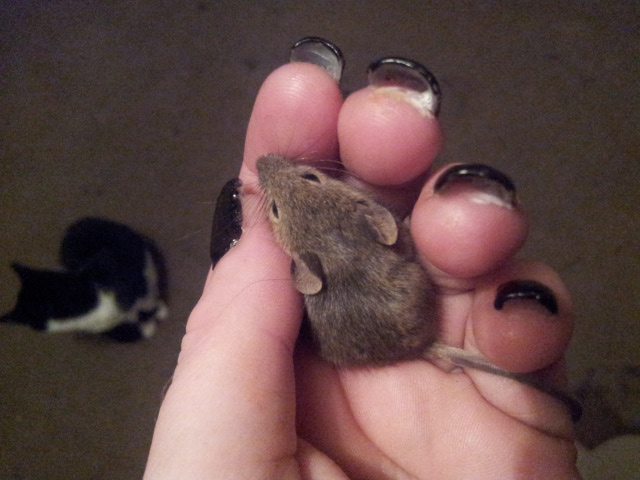 How to get rid of field mice under my sink
QuestionQUESTION: Hi just a quick question i have found
How to get rid of field mice under my sink
QuestionQUESTION: Hi just a quick question i have found
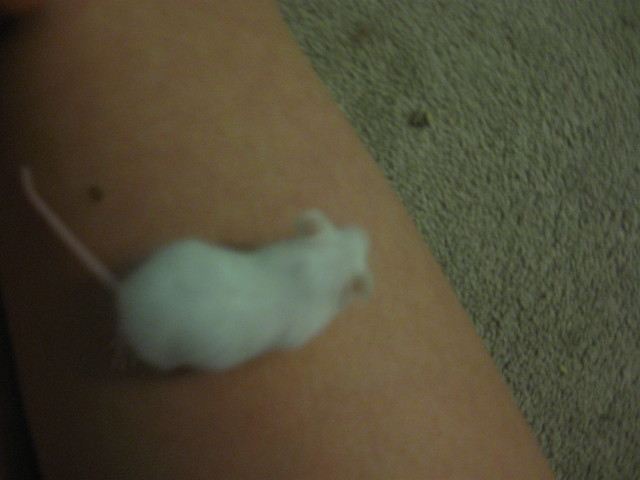 Could My Mouse Be Pregnant?
Question
My Maybe Prego Mouse P
My friend bought me a m
Could My Mouse Be Pregnant?
Question
My Maybe Prego Mouse P
My friend bought me a m
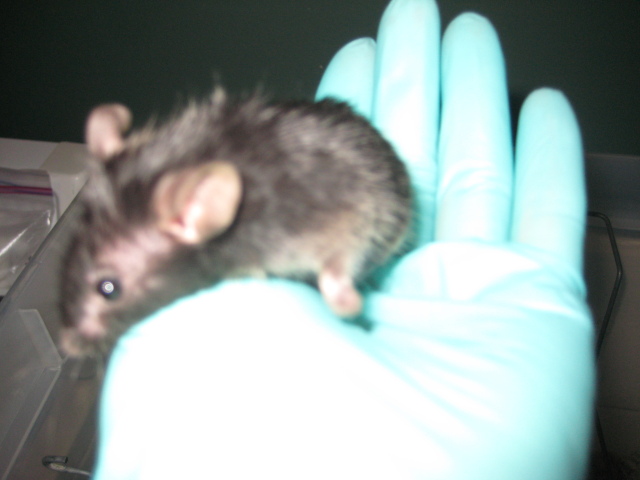 Another cure for mouse mites- ivermectin
Question
Tommys thin hair
Hi Natasha,
You have been so
Another cure for mouse mites- ivermectin
Question
Tommys thin hair
Hi Natasha,
You have been so
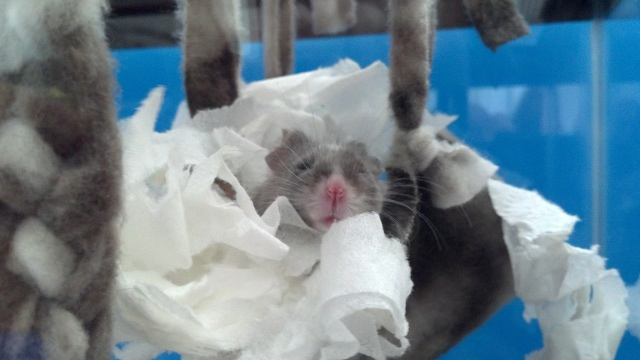 Did I hurt my mouse trying to help her?
Question
My little Loopy Luna C
Hi Natasha,
Ive
Did I hurt my mouse trying to help her?
Question
My little Loopy Luna C
Hi Natasha,
Ive
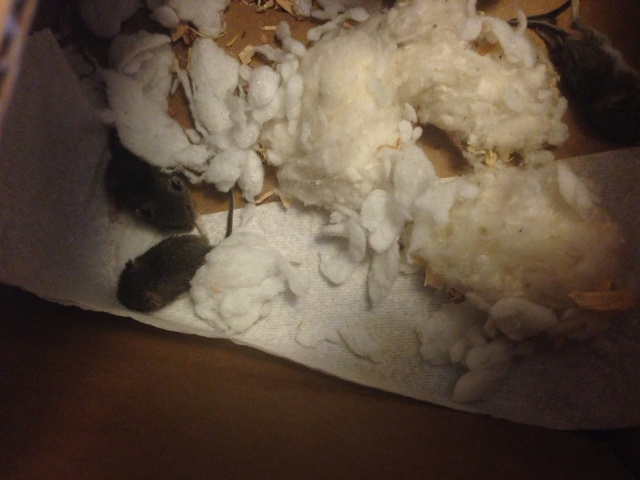 Raising orphan mice/disease?
Question
2 Baby Mice
Hello
We had just found
Raising orphan mice/disease?
Question
2 Baby Mice
Hello
We had just found